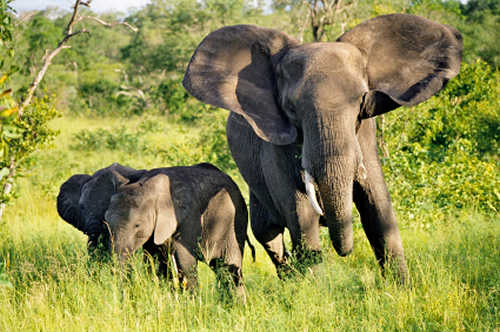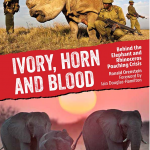The global implications of illegal ivory and rhino horn trafficking were examined during the United States Senate Committee on Foreign Relations Hearing held on May 24th, 2012.
“How shockingly destructive and historically shameful it would be if we did nothing while a great species was criminally slaughtered into extinction. Yet here we are in the midst of one of the most tragic and outrageous assaults on our shared inheritance that I’ve seen in my lifetime, where an elephant’s dead ivory is prized over its living condition, where corruption feeds on its body and soul, and where money only makes matters worse.” — from Senator John Kerry’s opening remarks.
At the U.S. Senate Hearing, testimony regarding the clear connection between global insecurity and a surging ivory and rhino horn trade was heard by Senator John Kerry. Witnesses included Dr. Iain Douglas-Hamilton (Founder, Save the Elephants), John Scanlon (Secretary-General of CITES), and Tom Cardamone (Managing Director, Global Financial Integrity).
A failure to control ivory trade
Dr. Douglas-Hamilton testified that elephants are currently being killed at nearly the same rate as the 1980s, prior to the ivory ban.
He noted that since 2007, illegal ivory seizures in Kenya have risen 800 percent and that Chinese nationals are involved in 90 percent of ivory seizures at the country’s airports.
He also pointed out that the CITES decision to allow a one-off sale of ivory to China in 2008 “exacerbated” Africa’s elephant crisis and that ivory traffickers “exploited” the situation.
The result appears to have been a spike in demand, fed by the growing wealth of China and its neighbors, the confusion over legal vs. illegal ivory, and the predictable willingness of ivory traders to exploit that confusion and sell illegally harvested ivory as though it were legal.
According to Dr. Douglas-Hamilton, ivory trade controls “have failed”.
The preponderance of illegal ivory in China makes anything less than a moratorium a distraction and impracticable.
He suggested that China declare a “unilateral ten-year moratorium on ivory imports” and that Thailand “enact serious legislative reforms to control its internal ivory market”, and recommended that the U.S. apply the Pelly Amendment in certain cases.
Wildlife trafficking up to $10 billion annually
Tom Cardamone stated that Global Financial Integrity had estimated the value of the illegal wildlife trade (excluding fishing) at between $7.8 and $10 billion annually, and that an “alarming up-tick in the scale of the industry” has prompted U.S. national security concerns.
He pointed out that the risks involved for engaging in wildlife trafficking are quite small compared to similar types of international organized crime, such as drug trafficking, which carries the death penalty in some countries.
‘Shell companies’ used by wildlife traffickers
Wildlife traffickers employ the “same mechanisms used by Viktor Bout, drug cartels, and terrorist groups” — notably “shell companies” — to evade detection by law enforcement.
In his written testimony, Mr. Cardamone said that these opaque entities are used to launder money for illicit activities.
Anonymous shell companies are utilized by the arms dealers who supply animal traffickers, militants and terrorists with weaponry. They are used by the corrupt public official who accepts kickbacks and bribes into his or her offshore account in order to look the other way as poachers illegally pillage their country’s natural resources. They are used by terrorists looking to clandestinely move their money around the world to finance their heinous crimes. They are used by rogue regimes, like Iran and North Korea, to circumvent international sanctions. They are used by drug traffickers like those in Mexico who have killed 50,000 people in their country in just the past six years. Finally, they are used by tax evaders, who cost the developing world an estimated $1 trillion per year in illicit outflows.
He warned that the United States is a “breeding ground” for shell companies, due to “lax regulation” and “disparate state statutes”, adding that it is the “locale of choice” for money laundering by corrupt foreign politicians.
Terrorism funded by illegal wildlife trade
Further details provided in Mr. Cardamone’s written testimony connected wildlife trafficking to insurgent groups, terrorism, and drug cartels.
In Africa, ongoing armed conflicts and the illegal wildlife trade are intertwined, and the following groups have reportedly benefited from ivory and wildlife trafficking:
Sudan People’s Liberation Army (South Sudan), the Janjaweed, Congolese Army, Rwandan Democratic Liberation Forces (FDLR), National Congress for the Defense of the People (CNDP), National Union for the Total Independence of Angola (UNITA), and the Mozambican National Resistance (RENAMO).
Mr. Cardamone noted that Al Qaeda affiliates in Bangladesh and Somalia use wildlife trafficking to finance terrorist activities. He named the Jama’atul Mujahideen Bangladesh (JMB), Harkat-ul-Jihad-al-Islami (HuJI) and Al Shabaab, and said these groups are using ivory and rhino horn, along with other illicit wildlife parts, to fund their operations.
Additionally, he pointed out that illegal wildlife traders and drug traffickers “utilize similar smuggling routes”, citing a link between the notorious Medellin drug cartel and illegal bird trafficking.
‘Sophisticated’ organized crime networks
Secretary-General of CITES, Mr. John Scanlon testified that “it is very clear organized crime is actively involved in the illegal trade of wildlife” and cited elephant ivory and rhino horn as examples.
You can’t take 800 kilograms of ivory from Central Africa, export it through East Africa into Asia without very organized and sophisticated networks and these are what in place to trade illegally in the substance. And with rhino, we’ve gone from 13 rhino illegally killed in South Africa in 2007 to 448 illegally killed in 2011, and the numbers are up to 220 already this year, putting us on track for illegal killings up to 600.
According to Mr. Scanlon, violent criminal syndicates are depriving states of legitimate sources of revenue by exploiting local people in some of the world’s poorest countries, corrupting officials, and wounding and killing enforcement officers on the ground.
This is undermining governments, it is undermining the rule of law, it is undermining security and it must be stopped.
Despite these threats to national and international security, he acknowledged that very few suspects are convicted and incarcerated when they are caught engaging in illegal activities, such as trading in elephant ivory or rhino horn.
Mr. Scanlon noted in his written testimony that anti-poaching personnel cannot break the smuggling chain, and that customs and police must coordinate across range, transit and consumer states in order to effectively tackle the illicit wildlife trade.
Ivory appetite whetted
After hearing the testimonies, Senator Kerry pointed out that the one-off ivory sale seemed to have whetted China’s appetite for ivory, and that three countries “stand out for their illegal activities”.
Well, the bottom line remains that you’ve got two countries, maybe three, that stand out for their illegal activities. China, Thailand, and Vietnam.
Mr. Scanlon said there are “differing opinions” as to whether or not the one-off ivory sale is connected to the current demand for ivory and resulting elephant crisis.
Ivory stockpiles
Later in the hearing, Senator Kerry asked how much of the “seized material finds its way back into the market” and wondered if it “stays in the evidence room” or if it was destroyed.
Should there be a part of the Convention that requires that all stocks are assembled and in fact destroyed? Because if there’s secondary value, seizing it and then selling it, or putting it into the black market under the table or otherwise, doesn’t do you much good because you still have the same incentive to go after it.
Dr. Douglas-Hamilton explained that destroying ivory stockpiles is a “very good solution” and suggested that countries which destroy ivory stockpiles be financially rewarded.
Recommended: Watch the entire hearing on C-Span and download the written testimonies.
Image © iStockphoto.com






2 thoughts on “U.S. Senate Hearing: Elephant Killings, Ivory Trade Undermining Global Security”
Comments are closed.